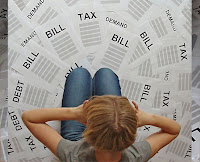 Chapter 13 Bankruptcy
Chapter 13 BankruptcyChapter 13 bankruptcies are for individuals, not businesses. Filing for a Chapter 13 bankruptcy is a good choice for people who are trying to pay off their debt but need more time, and protection from the court, in order to do so. A Chapter 13 bankruptcy will allow you to make up your missed payments by giving you more time, and will still leave you the option of filing for Chapter 7 bankruptcy if it should become necessary. In order to qualify for a Chapter 13 bankruptcy, you must have filed your federal and state tax returns for the four years prior to filing.
Chapter 7 BankruptcyChapter 7 bankruptcies are a way to have your federal income tax debt discharged, but there are strict rules regarding who is eligible and what can be discharged. Only income taxes can be discharged; no other types of debt are allowed. In order to file for Chapter 7 bankruptcy protection, you must have filed your federal income tax return for two years before filing for bankruptcy, three years must have passed before you filed for bankruptcy, and you must not have committed fraud. Even if your tax debt is discharged, if there were liens against your property before you filed for
bankruptcy the liens are still in effect.
Chapter 11 BankruptcyA Chapter 11 bankruptcy is primarily a way for a business to restructure its debt, but in some cases individuals may also qualify. Businesses that may file for Chapter 11 bankruptcy protection include sole proprietorships, limited liability companies, partnerships, limited partnerships, corporations, and not-for-profit corporations. In a Chapter 11 bankruptcy, businesses can usually continue their daily business operations, but they will be under the supervision of the bankruptcy court. Depending on the size of the business and its debt, Chapter 11 bankruptcy may be completed in as little as a few months, or it could take many years. Chapter 11 bankruptcy does not discharge debt.
Chapter 12 BankruptcyA Chapter 12 bankruptcy is a special type of bankruptcy that only family farmers and family fishermen are eligible for. The Chapter 12 bankruptcy was created in the mid-1980s for the purpose of protecting the livelihoods of family farmers who were facing serious economic hardship. Because it deals with such a small and specific group of people, a Chapter 12 Bankruptcy is usually easier and less expensive to file, for those meeting the requirements. At least 50% of your income must have come from farming or fishing in order to qualify, and there is a maximum amount of debt that can be included. In a Chapter 12 bankruptcy it is possible to both restructure your debt repayment and to discharge a portion of your debt.
Bankruptcy and ForeclosureIf you are in danger of losing your home, you may be able to file for Chapter 13 bankruptcy. Chapter 13 bankruptcy is a repayment plan, not a way to discharge your
mortgage debt. You must have a regular source of income in order to qualify for Chapter 13 bankruptcy, and you must submit a plan for getting caught up on your mortgage. A Chapter 13 bankruptcy will give you more time to pay what you owe, and protect you from foreclosure while you are getting caught up. You usually have three years to repay what you owe and get current on your mortgage again.
Types of Bankruptcy DebtSome types of debt can almost never be eliminated through bankruptcy. Examples of debt that cannot normally be discharged as the result of a bankruptcy include child support payments, alimony payments, federal student loan payments, mortgage debt and property liens that were not discharged during the bankruptcy, loans that you received as a result of giving knowingly false or fraudulent information, and debt that was not listed on your bankruptcy petition. There are some exceptions to these rules, and a qualified
bankruptcy lawyer or other professional should always be contacted to help you determine what your liability is, and whether or not you qualify for an exemption.
Bankruptcy and CreditorsWhether or not to
file for bankruptcy is one of the most stressful decisions you may ever have to make. Adding to the stress and embarrassment is the constant ringing of the telephone, signaling that another one of your creditors is calling yet again, demanding to know when you’ll be making a payment. Once you file for bankruptcy, you are protected from receiving these distressing phone calls. The court will notify all of your creditors of the impending bankruptcy; once they receive this notice, they must immediately stop calling you. If they do not stop, they could face financial penalties and/or legal action. Because it may take a few weeks for the court notices to be received, you have the right to inform your creditors directly that you have filed for bankruptcy protection.
Bankruptcy and MarriageIf you are married and considering filing for bankruptcy, you will need to decide whether only one or both spouses should file since it is impossible to remove a bankruptcy successfully once it is filed. If you and your spouse have eligible joint debt, you can receive double exemptions. However, if only one of has
debt, or you or your spouse have additional debt that is not dischargeable, it may be better for only one of you to file for bankruptcy. In cases of legal separation, the decision becomes more complicated. Debt that is discharged through a bankruptcy for one spouse may show up on the other spouse’s credit report. It is important to consult a qualified bankruptcy professional before deciding whether to file jointly or separately.
Bankruptcy and Court AppearancesMany people may delay
filing for bankruptcy protection because they fear the stress and embarrassment of having to appear in court. In most cases, you will not have to appear before a judge, but you will have to meet with any of your creditors who choose to appear, as well as the appointed bankruptcy trustee. In many cases, creditors choose not to appear, for one reason or another. The meeting will consist of a series of questions and answers about your current financial situation and your bankruptcy application. If you choose to dispute a particular debt, the creditor has the right to file a motion requiring an appearance before a judge.
Who Will Be Notified of My Bankruptcy Filing?When you file for bankruptcy, the only parties required to be notified are the bankruptcy court, your creditors, and the Internal Revenue Service (although the bankruptcy filing will have no effect on your tax burden). Unless your employer is also one of your creditors, your employer will not be notified that you have filed for bankruptcy. A
bankruptcy filing is a matter of public record, so theoretically anyone could search for that information, if they so chose. This is generally unlikely, however. As a rule, only those directly involved in your case will know that you have filed for bankruptcy.
 How to Stop Bankruptcy
How to Stop Bankruptcy


